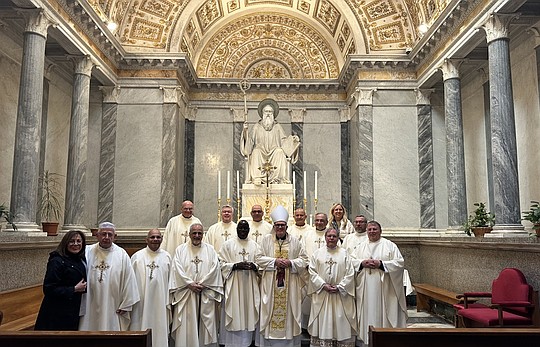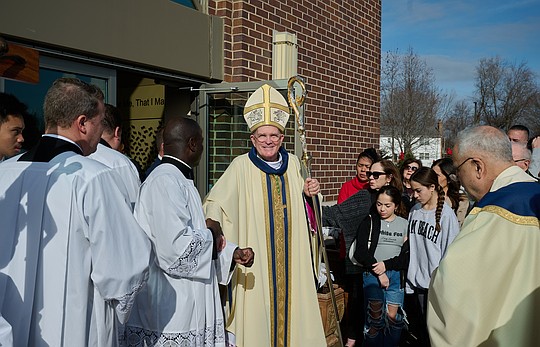The Redemptorist Parish Priest-A reflection by Father John McGowan
February 15, 2022 at 11:04 a.m.

He came to this country over 190 years ago as a missionary priest, eager to learn any new language and trek the immense continent, seeking out the ordinary people. He came bundled with plenty of Good News for poor immigrants like himself. He came as a Redemptorist.
As he crossed the vast ocean, he dreamed of mounting any pulpit, stepping down any street, stopping into any hovel just to reach them, to touch them, to save them. He expected to go out from a large monastery like he did back home and walk, ride or coach across the new world, preaching powerful and persuasive missions. Never in his life had he experienced what the American Church calls “the parish;” not until he landed on American shores. Although he would always see himself as a missionary at heart, for the most part he became a Redemptorist parish priest.
He was like so many of the other good American parish priests, but there was something different about him, something unique, something special. Was it because he was like the people? Was it because he was one of them, talked like them, used their words, knew their first names? He seemed always to be there. His church and his rectory were open from dawn to dusk. Like his people, he too, lived a family life. He prayed and ate and laughed and lived in a home with his Redemptorist family. He waited on tables, washed dishes, did the shopping and even sat around at night telling stories.
He built gray gothic churches in the middle of their cities and coupled them with schools and halls, convents and rectories. Since he dreamed big, his edifices were big, and rose like rockets from the streets of Manhattan, Philadelphia, Boston, Baltimore, Chicago, St. Louis, Brooklyn, Toronto, Houston, San Francisco, Miami, Winnipeg and Edmonton.
In those places, he pointed his people to the golden tabernacle door and fed them daily with the Bread of Life. He held his mission cross high so they could gaze on such great redeeming love. He told them of the enfleshed God who became a baby for them, loved and died for them, and never really left them. And for hours, he sat in the forgiving darkness of confessional closets, waving away sins like flies and making things right again.And in all those churches, he made sure there was a special place for the Lady and the Child in the golden icon - The Mother of Perpetual Help. He led them to this perpetually helping Mother who then pointed them to her Son. He made sure she was all over the parish. He had her framed and placarded, plastered and papered, leafleted and even wafer-ed. His people knew who she was.
He was always with his people, forever available. He looked on his parish priest days as days of privilege, wonderful moments of grace and life. He heard the laughter of their weddings, graduations and baptisms. He tasted the tears of their sickness and death, their mistakes and sins. He got them out of trouble and into heaven by walking with them as one of them. And they grew old together.
In recent years, he would often be asked, “Are you a Redemptorist?” He would nod and ask, “How did you know?” and he would be told, “I can tell. I just know. There’s something special about you.”
Related Stories
Saturday, January 03, 2026
E-Editions
Events
He came to this country over 190 years ago as a missionary priest, eager to learn any new language and trek the immense continent, seeking out the ordinary people. He came bundled with plenty of Good News for poor immigrants like himself. He came as a Redemptorist.
As he crossed the vast ocean, he dreamed of mounting any pulpit, stepping down any street, stopping into any hovel just to reach them, to touch them, to save them. He expected to go out from a large monastery like he did back home and walk, ride or coach across the new world, preaching powerful and persuasive missions. Never in his life had he experienced what the American Church calls “the parish;” not until he landed on American shores. Although he would always see himself as a missionary at heart, for the most part he became a Redemptorist parish priest.
He was like so many of the other good American parish priests, but there was something different about him, something unique, something special. Was it because he was like the people? Was it because he was one of them, talked like them, used their words, knew their first names? He seemed always to be there. His church and his rectory were open from dawn to dusk. Like his people, he too, lived a family life. He prayed and ate and laughed and lived in a home with his Redemptorist family. He waited on tables, washed dishes, did the shopping and even sat around at night telling stories.
He built gray gothic churches in the middle of their cities and coupled them with schools and halls, convents and rectories. Since he dreamed big, his edifices were big, and rose like rockets from the streets of Manhattan, Philadelphia, Boston, Baltimore, Chicago, St. Louis, Brooklyn, Toronto, Houston, San Francisco, Miami, Winnipeg and Edmonton.
In those places, he pointed his people to the golden tabernacle door and fed them daily with the Bread of Life. He held his mission cross high so they could gaze on such great redeeming love. He told them of the enfleshed God who became a baby for them, loved and died for them, and never really left them. And for hours, he sat in the forgiving darkness of confessional closets, waving away sins like flies and making things right again.And in all those churches, he made sure there was a special place for the Lady and the Child in the golden icon - The Mother of Perpetual Help. He led them to this perpetually helping Mother who then pointed them to her Son. He made sure she was all over the parish. He had her framed and placarded, plastered and papered, leafleted and even wafer-ed. His people knew who she was.
He was always with his people, forever available. He looked on his parish priest days as days of privilege, wonderful moments of grace and life. He heard the laughter of their weddings, graduations and baptisms. He tasted the tears of their sickness and death, their mistakes and sins. He got them out of trouble and into heaven by walking with them as one of them. And they grew old together.
In recent years, he would often be asked, “Are you a Redemptorist?” He would nod and ask, “How did you know?” and he would be told, “I can tell. I just know. There’s something special about you.”










